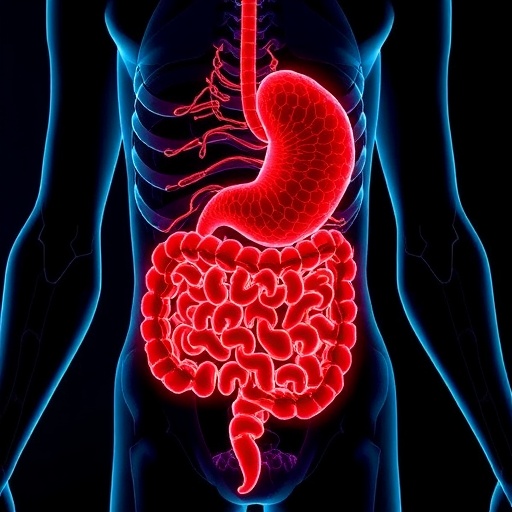In a groundbreaking study recently published in Nature, scientists have unveiled a sophisticated mechanism employed by a virulent strain of Escherichia coli (E. coli) to circumvent the gut’s innate cellular defenses. This particular strain, infamous for inducing bloody diarrhea, utilizes a cunning strategy to disrupt the gut’s frontline defense system, allowing it to colonize more efficiently and evade clearance from the intestinal lining.
Ordinarily, the gastrointestinal tract is lined with a tightly sealed layer of epithelial cells forming a dynamic barrier that not only facilitates nutrient absorption but also acts as a vigilant sentinel against invading microbes. A critical innate defense involves the extrusion of infected epithelial cells — a process by which compromised cells are physically pushed out of the epithelial layer to be swiftly expelled from the body, effectively halting the progression of infection. This cell extrusion is regulated by specific molecular pathways, ensuring that infected or damaged cells do not persist and propagate infection.
The research team, comprising molecular microbiologists and biochemical experts from Genentech and Oregon Health & Science University (OHSU), has demonstrated that this harmful E. coli strain expresses a virulence protein named NleL, which subverts the extrusion process. NleL acts by targeting and dismantling Rho-associated protein kinases, specifically ROCK1 and ROCK2, enzymes pivotal for controlling the cytoskeletal dynamics that drive infected cell expulsion. The proteolytic activity of NleL thus cripples the cellular machinery that facilitates infected cell egress, enabling the bacteria to persist within the gut epithelium.
This discovery reveals a novel bacterial strategy that diverges markedly from established paradigms of immune evasion. While many pathogens evade host defenses by masking themselves to avoid immune detection, this E. coli strain directly sabotages the host cell’s ability to escape, effectively turning the epithelial defense mechanism on its head. By immobilizing infected cells, the bacteria gain an extended window to replicate intracellularly, subsequently increasing bacterial load and exacerbating infection severity.
The implications of this finding extend far beyond infectious disease, offering deep insights into gut biology and the delicate interplay between host tissues and microbiota. The gut epithelium has historically been perceived as a passive barrier, but research continues to underscore its active role in immune surveillance and rapid response to microbial insult. The elucidation of ROCK-dependent epithelial extrusion pathways and their subversion by pathogens marks a significant advancement in our understanding of gut mucosal immunity.
The lead investigator, Isabella Rauch, Ph.D., an associate professor at OHSU specializing in molecular microbiology and immunology, emphasized the transformative nature of this mechanism. “Our findings uncover a completely novel bacterial approach: rather than hiding, this pathogen directly obstructs a critical host defense pathway,” she noted. “This has wide-reaching implications for how we think about host-pathogen interactions.”
Central to their research methodology was the integration of sophisticated biochemical assays and cutting-edge gut tissue models. Genentech scientists characterized the molecular activity of NleL, revealing its enzymatic breakdown of ROCK1/2, while Rauch’s lab employed in vitro systems mimicking human intestinal tissue to observe the functional consequences of NleL expression on epithelial cell behavior. This multidisciplinary collaboration allowed for compelling evidence that these molecular interactions translate into tangible effects on gut epithelial integrity during infection.
Beyond expanding basic scientific knowledge, the study opens promising avenues for therapeutic intervention. Conventional treatments for bacterial infections largely rely on antibiotics, which indiscriminately target bacterial viability and are increasingly compromised by rising antimicrobial resistance. Targeting virulence factors such as NleL could present an alternative therapeutic strategy that disarms pathogens without killing them directly, thereby reducing selective pressures for resistance development.
Furthermore, this mechanism may provide new understanding related to chronic gut disorders. Diseases such as inflammatory bowel disease (IBD) are characterized by dysregulated epithelial turnover and excessive extrusion, contributing to barrier dysfunction and persistent inflammation. Investigating how extrusion pathways are modulated or disrupted can shed light on the pathogenesis of IBD and potentially gastrointestinal malignancies wherein epithelial homeostasis is disrupted.
The public health ramifications of these findings are profound, particularly as climate change and lapses in food safety regulations threaten to escalate the incidence of such bacterial infections globally. Vulnerable populations, especially young children in low-resource settings, face heightened risk due to their limited capacity to withstand fluid loss caused by infection. Efforts to monitor and control foodborne pathogens must therefore intensify in conjunction with deeper molecular insights into pathogen-host interactions gained from studies like this.
In conclusion, this seminal work not only reveals an unprecedented bacterial evasion tactic but also reinforces the intricate functionality of the gut epithelium as an active immunological participant. By delineating how pathogenic E. coli hinders epithelial cell extrusion through enzymatic disruption of ROCK kinases, the research paves the way for innovative anti-virulence therapies. Such approaches promise to complement or even supersede traditional antibiotics, marking an exciting frontier in combating enteric infections and improving gastrointestinal health.
Subject of Research: Bacterial pathogenesis and host epithelial defense mechanisms in the gut.
Article Title: Enteropathogenic bacteria evade ROCK-driven epithelial cell extrusion
News Publication Date: Not specified in the provided content
Web References:
- Nature article: https://www.nature.com/articles/s41586-025-09645-0
- DOI link: http://dx.doi.org/10.1038/s41586-025-09645-0
References:
- Publication in Nature
- Research collaboration between Genentech (Roche Group) and Oregon Health & Science University
Keywords: Bacteria, Gut microbiota, Enteropathogenic E. coli, Epithelial cell extrusion, ROCK1/ROCK2 kinases, Gut epithelium, Anti-virulence therapy, Inflammatory bowel disease (IBD), Microbial pathogenesis, Host-pathogen interaction




